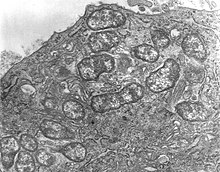恙蟲東方體
| 恙蟲病東方體 | |
|---|---|

| |
| 恙蟲病東方體(Orientia tsutsugamushi) | |
| 科学分类 | |
| 域: | 细菌域 Bacteria |
| 界: | 细菌界 Bacteria |
| 门: | 變形菌門 Pseudomonadota |
| 纲: | α-变形菌纲 Alphaproteobacteria |
| 目: | 立克次體目 Rickettsiales |
| 科: | 立克次體科 Rickettsiaceae |
| 属: | 東方體屬 Orientia |
| 种: | 恙蟲病東方體 O. tsutsugamushi
|
| 二名法 | |
| Orientia tsutsugamushi (Hayashi 1920) Tamura et al. 1995
| |
恙蟲病東方體(Orientia tsutsugamushi)是恙蟲病的病原體。其種小名「tsutsugamushi」源自於日语「つつがむし」,為日本漢字「恙虫」兩字的發音[1]。恙蟲東方體的自然病媒及傳染窩為鉤恙蟎屬類的恙蟎[2][3]。
恙蟲病東方體為胞內病原體,需寄生於真核細胞內才能繁殖。其外膜結構類似革兰氏阴性菌,但並不容易以革蘭氏染色染色,必須採用Gimenez stain。恙蟲病東方體具有多種血清型,主要血清型包含 Karp(占總感染病例的半數)[3],另外還有Gilliam(25%)[3]、Kato(<10%)[3],以及Kawasaki等[4]。恙蟲東方體的血清型變化相當多樣[5][6][7],如馬來西亞同時就有八種血清型通報[8]。恙蟲病棘手的部分在於感染某一血清型之後,不代表對於其他血清型會具有免疫力。另外恙蟲東方體也可能在同一個體重複感染。
微生物學[编辑]
恙蟲東方體一開始被歸類於立克次體[1],但後來被重新分類於東方體屬,恙蟲東方體為該屬的唯一物種[9]。
本種長約 1.2 至 3.0 µm,寬約 0.5 µm ,屬於絕對胞內寄生細菌。由於該物種毒力高,需於第三級以上防護實驗室才能操作[10]。
抗生素療法[编辑]
恙蟲病東方體在體外對於多西环素、利福平,及阿奇霉素等抗生素敏感。但對β-内酰胺類藥物(如青黴素)則有抗藥性,因為本物種缺乏肽聚糖[11]。另外氨基糖苷类抗生素(如庆大霉素)在人體中也無效,因為該物種在活體內會寄生於細胞內,但此類抗生素無法穿越細胞膜。
疫苗[编辑]
目前恙蟲東方體尚無有效的疫苗,因為該物種具有許多血清型,且即使感染了一種血清型,也無法確保人體能對於另一種血清型產生免疫力。
參考文獻[编辑]
- ^ 1.0 1.1 Watt G, Parola P. Scrub typhus and tropical rickettsioses. Curr Opin Infect Dis. October 2003, 16 (5): 429–36 [2016-04-29]. PMID 14501995. doi:10.1097/00001432-200310000-00009. (原始内容存档于2012-03-11).
- ^ Traub R, Wisseman CL Jr. The ecology of chigger-borne rickettsiosis (scrub typhus). J Med Entomol. 1974, 11 (3): 237–303 [2016-04-29]. PMID 4212400. doi:10.1093/jmedent/11.3.237. (原始内容存档于2014-03-02).
- ^ 3.0 3.1 3.2 3.3 Kelly DJ, Fuerst PA, Ching W-M, Richards AL. Scrub typhus: The geographic distribution of phenotypic and genotypic variants of Orientia tsutsugamushi. Clin Infect Dis. 2009, 48 (s3): S203–30. PMID 19220144. doi:10.1086/596576.
- ^ Yamamoto S, Kawabata N, Tamura A, et al. Immunological properties of Rickettsia tsutsugamushi, Kawasaki strain, isolated from a patient in Kyushu. Microbiol Immunol. 1986, 30 (7): 611–20 [2016-04-29]. PMID 3095612. doi:10.1111/j.1348-0421.1986.tb02988.x. (原始内容存档于2017-09-21).
- ^ Kang JS, Chang WH. Antigenic relationship among the eight prototype and new serotype strains of Orientia tsutsugamushi revealed by monoclonal antibodies. Microbiol Immunol. 1999, 43 (3): 229–34 [2016-04-29]. PMID 10338191. doi:10.1111/j.1348-0421.1999.tb02397.x. (原始内容存档于2017-09-21).
- ^ Bakshi D, Singhal P, Mahajan SK, Subramaniam P, Tuteja U, Batra HV. Development of a real-time PCR assay for the diagnosis of scrub typhus cases in India and evidence of the prevalence of new genotype of O. tsutsugamushi. Acta Trop. 2007, 104 (1): 63–71. PMID 17870041. doi:10.1016/j.actatropica.2007.07.013.
- ^ Parola P, Blacksell SD, Phetsouvanh R, et al. Genotyping of Orientia tsutsugamushi from Humans with Scrub Typhus, Laos. Emerg Infect Dis. 2008, 14 (9): 1483–1485. PMC 2603112
 . PMID 18760027. doi:10.3201/eid1409.071259.
. PMID 18760027. doi:10.3201/eid1409.071259.
- ^ Shirai A, Tanskul PL, Andre, RG; et al. Rickettsia tsutsugamushi strains found in chiggers collected in Thailand. Southeast Asian J Trop Med Public Health. 1981, 12 (1): 1–6. PMID 6789455.
- ^ Tamura A, Ohashi N, Urakami H, Miyamura S. Classification of Rickettsia tsutsugamushi in a new genus, Orientia gen. nov., as Orientia tsutsugamushi comb. nov. Int J Syst Bacteriol. 1995, 45 (3): 589–591. PMID 8590688. doi:10.1099/00207713-45-3-589.
- ^ Centers for Disease Control and Prevention. Section VII-E: Rickettsial Agents. Biosafety in Microbiological and Biomedical Laboratories (BMBL) 4th. Washington DC: U.S. Government Printing Office. 1999: 149–53 [13 Mar 2009]. (原始内容存档于2010-05-13).
- ^ Amano K, Tamura A, Ohashi N, Urakami H, Kaya S, Fukushi K. Deficiency of peptidoglycan and lipopolysaccharide components in Rickettsia tsutsugamushi. Infect Immun. 1987, 55 (9): 2290–2. PMC 260693
 . PMID 3114150.
. PMID 3114150.
- Orientia tsutsugamushi. NCBI Taxonomy Browser. [2016-04-29]. 784. (原始内容存档于2019-05-24).
| |||||||||||||||||||||||||||||||||||||||||||||||||||||||||||||||||||||||||||||||||||||||||||||||||||||||||||||||||||||||||||||||||||||||||||||||||||||||||||||||||||
|
